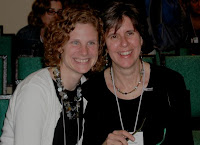National Writing Projects: the State Network
Bill Tucker
A dozen or so EMWP teachers have benefited from the summer retreats of the National Writing Projects of Michigan, and
NWPM has recently benefited from our teachers’ sharing about teacher research and Family Literacy. Next summer the NWPM will sponsor a number of special interest groups, inviting small groups of teachers from each Writing Project site to participate.

Two opportunities are known as we go to press:
First, a regional version of the Holocaust Educators’ Seminars in Kalamazoo, August 6-12.
Second, an updated version of the digital writing workshops of WIDEPATHS, offered at Michigan State U. August 8-11.
The Holocaust Educators’ Network has sponsored national workshops in New York for many years, and K-12 teachers from Upper Peninsula Writing Project and the Third Coast Writing Project have attended them, with the sponsorship of the National Writing Project. This summer they will share what they have learned with their sister sites in NWPM. Two teachers from each site will be accepted. Corey Harbaugh, one of the organizers reports,
Our program will begin with an opening dinner Sunday, August 7- and conclude Saturday, August 13. It will be hosted in Kalamazoo, and it is a residential experience, as we will have multiple evening activities, including trips to sites in SW Michigan, and of course, over to the Holocaust Memorial and other social justice sites near Detroit.
Here is a web address to the wiki-based website we will use before, during, and after our program this summer: http://holocausteducatorsnwpm.wikispaces.com/
Direct your questions to Corey [charbaugh@gobles.org] at the Third Coast Writing Project.
You may remember the WIDEPATHS workshops from the summer of 2009, even if you did not attend. Here is what their wiki says about their goals and programs
Since earning a designation as one of five federally-funded National Writing Project “Lead Technology Sites,” Red Cedar Writing Project at MSU has attempted to construct “wide paths” down which we can walk arm-in-arm with our colleagues as we all attempt to better understand how the emergence of various new technologies, pedagogies, theories and genres are changing our practices as writers and our work as teachers of writing [http://widepaths09.wikispaces.com].
This summer they will present revised workshops on digital writing for teachers willing to share these practices with their colleagues in the local sites. If you are interested in attending these workshops, contact Bill Tucker, since we will be limited in how many we can send. If you have questions about the content of the workshops, you should consult the wiki or contact Andrea Zellner [zellnera@msu.edu] for the most current thinking about this summer.
Keep alert for other special interest workshops (e. g., Michigan Portfolios or Math Lab) as plans unfold.
Read more!


